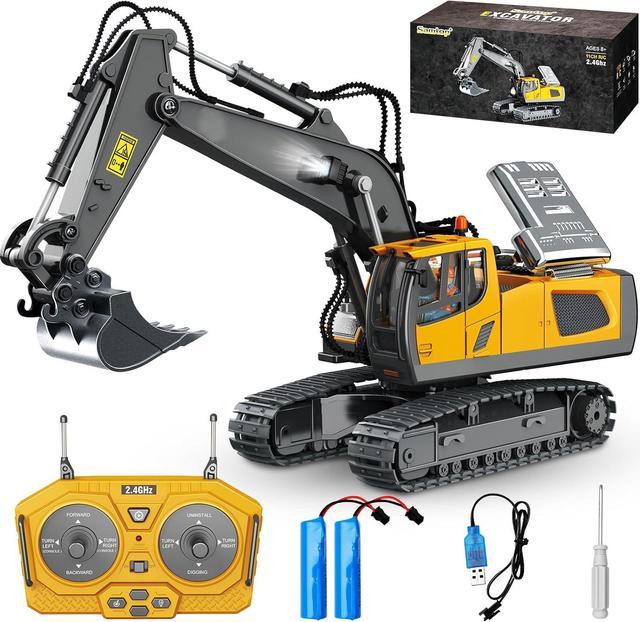Understanding Just How Excavator Works and Its Effect On Effectiveness
Excavators play a vital duty in building and construction and mining procedures, relying on a complex interaction of mechanical and hydraulic systems. Their capability to carry out a selection of tasks rests on both their layout and the innovation incorporated within. Recognizing these components can greatly influence operational performance and productivity. As improvements remain to improve the industry, one must think about just how these modifications will certainly affect future techniques and efficiency.
The Basics of Excavator Mechanics

The Function of Hydraulic Solutions in Excavators
At the heart of excavator operation lies the hydraulic system, which plays a crucial role in powering the machine's functions and movements. This system utilizes pressurized hydraulic fluid to move energy, enabling various actions such as digging, training, and swinging. By utilizing the principles of hydraulics, excavators can carry out jobs with impressive precision and force, boosting general functional efficiency.The hydraulic system contains key components, consisting of valves, pumps, and cylinders, which function with each other to control the flow and direction of the fluid. When the operator engages the controls, the hydraulic fluid is guided to details cylinders, converting the driver's commands into physical movement. This system permits receptive and smooth activities, which are important in building and construction and excavation environments. double e volvo rc excavator. The effectiveness of the hydraulic system directly affects the productivity and flexibility of the excavator, making it an important element in contemporary excavation procedures
Key Parts of an Excavator
Recognizing the essential components of an excavator is necessary for comprehending how this powerful maker operates. An excavator is composed of a number of considerable components, consisting of the undercarriage, home, arm, boom, and pail. The undercarriage gives stability and wheelchair, often including wheels or tracks to browse various surfaces. The home contains the engine and hydraulic systems, enabling the operator to manage motion and power the equipment. The boom expands from your house, making it possible for vertical reach, while the arm links to the pail, facilitating excavating and training operations.Additionally, the taxi houses the driver, geared up with controls for precise maneuvering. Each of these elements plays an essential duty in the excavator's total capability, contributing to its efficiency and efficiency on construction sites. Understanding these parts aids in enhancing and maintaining excavator efficiency, guaranteeing jobs are completed securely and efficiently.
Attachment Versatility and Its Benefits
Attachment flexibility is a crucial facet of excavators, making it possible for operators to change in between numerous tools customized for specific tasks. This flexibility not only improves work effectiveness yet likewise adds to cost-effectiveness by minimizing the need for several machines. Comprehending the various sorts of attachments available can greatly impact the overall performance and functionality of an excavator on job sites.
Sorts of Add-ons
While excavators are mostly identified for their digging capacities, their real flexibility exists in the broad variety of attachments readily available. These add-ons boost the excavator's functionality, allowing it to perform various tasks beyond excavation. Usual add-ons consist of containers (for excavating and scooping), hydraulic thumbs (for realizing materials), and augers (for drilling openings) Grapples are utilized for managing and moving particles, while rippers can separate tough surface areas. Other specialized attachments, such as plates and plows, make it possible for excavators to adapt to specific job requirements. This variety not only enhances the equipment's energy across various markets, including construction, landscape design, and demolition, but likewise allows operators to tailor their tools to fulfill certain task demands effectively.
Increased Task Performance
Taking full advantage of job effectiveness is a key advantage of utilizing numerous excavator accessories. Various add-ons permit an excavator to execute several jobs without requiring to switch over devices, conserving valuable time and labor. Utilizing a hydraulic hammer can damage concrete while a pail accessory can dig deep into dirt, making it possible for a seamless workflow. This adaptability minimizes downtime connected with equipment changes and boosts productivity on-site. In addition, specialized attachments improve accuracy in jobs such as grading or landscaping, bring about better end results. The capability to adapt to numerous task demands not only simplifies procedures yet likewise reduces the requirement for added equipment, making certain that projects are completed quickly and efficiently. Overall, attachment convenience substantially adds to enhanced work effectiveness in excavation job.
Cost-Effectiveness and Adaptability
Cost-effectiveness is a significant advantage of using flexible excavator accessories. These accessories permit a solitary excavator to do several jobs, reducing the demand for extra machinery and labor - double e volvo rc excavator. By changing in between buckets, hammers, and grapples, drivers can tackle numerous tasks, from digging to demolition, thereby optimizing tools usage. This flexibility not only decreases operational expenses yet additionally minimizes downtime related to altering tools. In addition, read what he said the ability to tailor excavators with specialized add-ons improves efficiency, as they can efficiently deal with varied tasks according to task needs. To conclude, the combination of cost-effectiveness and flexibility in excavator attachments adds to boosted operational efficiency and resource allotment in construction and excavation tasks

Advanced Technology in Modern Excavators
Modern excavators are progressively geared up with advanced technology that transforms excavation procedures. Automation enhances operations, while boosted gas efficiency decreases operational expenses. In addition, clever control systems enhance precision and security, noting a substantial evolution in excavation tools.
Automation in Excavation Processes
As excavation modern technology progresses, automation has actually arised as an important component in boosting performance and precision on work websites. Modern excavators are furnished with advanced automated systems that help with jobs such as grading, excavating, and trenching with very little operator treatment. These systems use sensors, GPS, and artificial intelligence algorithms to assure exact positioning and depth control, greatly reducing the margin for error. Furthermore, automation enables operators to concentrate on strategic decision-making instead of hand-operated controls, leading to boosted performance on the whole. Such advancements not only streamline process but likewise boost security by lessening human error in complicated procedures. The integration of automation in excavation processes represents a considerable advancement in construction modern technology, driving the sector in the direction of greater performance and performance.
Improved Fuel Efficiency
Advancements in innovation have actually likewise resulted in substantial improvements in gas performance for modern excavators. Modern makers are outfitted with sophisticated engines that maximize power output while decreasing fuel consumption. These engines make use of innovative burning innovations, such as turbocharging and straight fuel shot, to improve performance and performance. Furthermore, lightweight products in construction reduce general weight, allowing for less energy expenditure during operation. The intro of variable rate controls enables drivers to change engine performance according to details tasks, additionally reducing gas use. Therefore, these improvements not only lower functional costs but additionally add to environmental sustainability by reducing exhausts. On the whole, improved gas efficiency in excavators is an essential growth that bolsters efficiency and economic feasibility in the construction market.
Smart Control Solution
While operators browse progressively complicated task sites, smart control systems in excavators have actually become vital tools for boosting performance and precision. These innovative technologies use sensors and algorithms to check different parameters such as lots weight, surface conditions, and operational performance. By automatically adjusting hydraulic functions, smart systems optimize maker efficiency, bring about enhanced performance and lowered wear on elements. In addition, operators benefit from intuitive user interfaces that supply real-time comments and diagnostics, permitting notified decision-making. This combination of modern technology not only streamlines procedures however also lessens human mistake, adding to much safer work environments. As the construction industry proceeds to evolve, wise control systems will play an important function fit the future of excavator effectiveness and efficiency.
Enhancing Operational Effectiveness With Excavators
Excavators play an essential function in enhancing functional efficiency throughout different building and construction and excavation projects. Their adaptability enables numerous jobs, including digging, material, and training handling, which improves operations and lowers the requirement for added tools. With effective hydraulic systems, excavators can carry out heavy-duty jobs with precision, considerably reducing the time required to total projects. The assimilation of innovative modern technology, such as GPS and automated controls, better optimizes their procedure, making it possible for drivers to accomplish better accuracy and reduce material waste. Additionally, modern-day excavators are created to eat less gas and minimize discharges, adding to both cost financial savings and environmental sustainability. By using excavators efficiently, construction teams can improve efficiency, fulfill project due dates, and improve total site monitoring. This multifunctionality and efficiency make excavators crucial devices in the modern-day construction landscape.
The Future of Excavators in Building and Mining Industries
As the building and construction and mining sectors develop, the future of excavators is positioned for significant makeover driven by technological development and transforming functional demands. Developments in automation and artificial intelligence are reshaping excavator capacities, enabling improved precision and performance in procedures. Self-governing excavators are arising, reducing the need for human treatment and reducing the threat of accidents.Moreover, the combination of telematics and IoT technology allows real-time surveillance of device efficiency and anticipating maintenance, optimizing uptime. Green designs, including hybrid and electrical designs, are getting traction, aligning with sustainability goals within the industry.Additionally, the usage of advanced materials and lighter designs enhances fuel efficiency while keeping efficiency standards. As these patterns progress, excavators will play a vital function in satisfying the raising demands for productivity and safety in construction and mining, ultimately transforming operational landscapes.
Frequently Asked Concerns
How Do Climate Problems Influence Excavator Efficiency?

Weather greatly affect excavator performance, as rainfall and mud can hinder grip and stability, while extreme temperatures may affect hydraulic systems. Operators must adapt to these variables to assure ideal functionality and safety and security during operations.
What Safety And Security Measures Should Operators Adhere To While Utilizing Excavators?
Precaution for excavator operators consist of using appropriate personal protective equipment, conducting pre-operation assessments, making certain appropriate communication with ground workers, keeping a safe distance from overhead dangers, and sticking to established functional methods to protect against accidents.
Just How Commonly Should Excavators Be Preserved for Optimal Performance?
Excavators ought to be kept frequently to guarantee peak efficiency, typically every 250 operating hours or as specified by the supplier. Regular checks boost reliability, stop unanticipated failures, and prolong the lifespan of the equipment.
What Is the Average Life Expectancy of an Excavator?
The ordinary life expectancy of an excavator generally ranges from 10,000 to 15,000 hours of operation. Elements influencing check my blog long life consist of upkeep practices, running conditions, and the top quality of the device itself, influencing general productivity and performance.

Can Excavators Operate Irregular Terrain Effectively?
Excavators can run successfully on irregular terrain as a result of their articulated styles and flexible tracks. These features enable them to maintain stability and traction, allowing reliable operation in difficult settings frequently run into in building and construction and landscaping projects. Each of these elements plays an important role in the Going Here excavator's total performance, adding to its performance and effectiveness on construction websites. Making best use of work effectiveness is a key advantage of utilizing different excavator attachments. While drivers navigate significantly complex work websites, clever control systems in excavators have actually arised as vital devices for improving performance and precision. Excavators play a vital function in enhancing operational effectiveness across numerous building and excavation jobs. Breakthroughs in automation and fabricated knowledge are reshaping excavator capabilities, allowing for enhanced precision and efficiency in operations.
Comments on “How a rc excavator Can Transform Your Earthmoving Tasks”